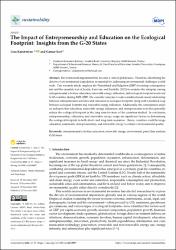The impact of entrepreneurship and education on the ecological footprint: insights from the G-20 states
Citation
Karabetyan, L.; Sart, G. The Impact of Entrepreneurship and Education on the Ecological Footprint: Insights from the G-20 States. Sustainability 2024, 16(1), 97.Abstract
Environmental impairment has become a critical global issue. Therefore, identifying the
drivers of environmental degradation is essential for addressing environmental challenges world wide. This research article employs the Westerlund and Edgerton (2007) bootstrap cointegration
test and the causality test of Juodis, Karavias, and Sarafidis (2021) to examine the interplay among
entrepreneurial activities, education, renewable energy utilization, and ecological footprint in selected
G-20 countries during 2002–2020. The causality analysis reveals a unidirectional causal relationship
between entrepreneurial activities and education to ecological footprint, along with a feedback loop
between ecological footprint and renewable energy utilization. Additionally, the cointegration analy sis indicates that education, renewable energy utilization, and entrepreneurial activities generally
reduce the ecological footprint in the long term for most of the countries studied. In conclusion,
entrepreneurship, education, and renewable energy usage are significant factors in determining
the ecological footprint in both short- and long-term scenarios. Hence, countries could leverage
education, sustainable entrepreneurship, and renewable energy to enhance environmental quality.
Source
SustainabilityVolume
16Issue
1URI
https://www.mdpi.com/2071-1050/16/1/97https://doi.org/10.3390/su16010097
https://hdl.handle.net/20.500.12780/768


















